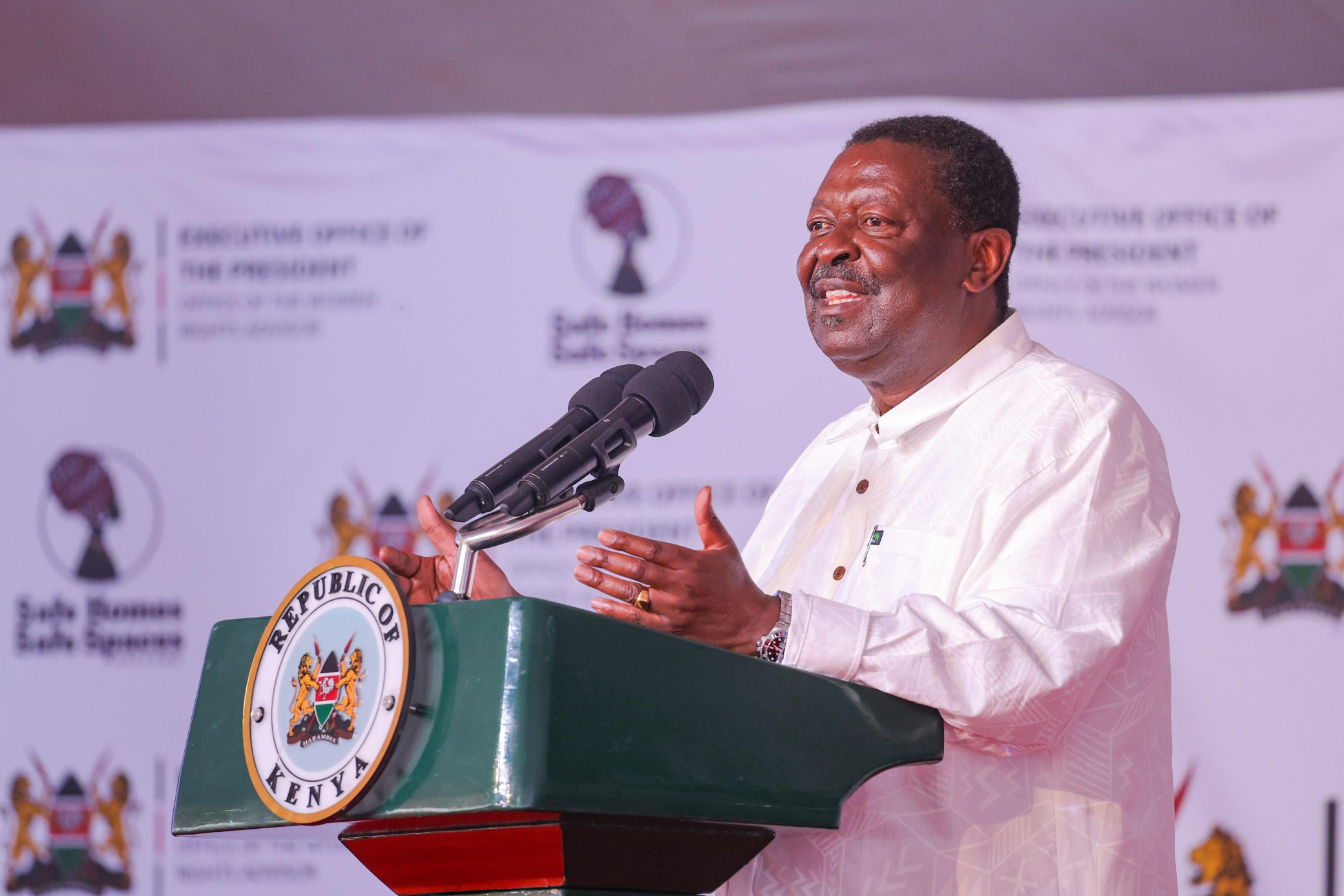
Gov’t seeks to establish sustainable GBV fund amid rising cases
The government, through the Office of the Women’s Rights Advisor, is exploring mechanisms to set up a sustainable Gender-Based Violence (GBV) fund to address the growing concerns over skyrocketing cases in the country.
Prime Cabinet Secretary Musalia Mudavadi announced that the fund would support government programs and campaigns to combat GBV and provide comprehensive care for survivors, as part of ongoing efforts to create a safer country for all.
Mudavadi made the remarks during the launch of the “Safe Homes Safe Spaces” initiative in Kakamega on Monday. The initiative underscores the urgent need for a collaborative, government-led campaign to spread awareness and encourage individuals and communities to adopt non-violent methods of conflict resolution.
“GBV is a major violation of women’s human rights, as well as a criminal and social problem. We are particularly alarmed by the recent spike in cases of violence against women, including intimate partner violence. This trend reflects a breakdown in our values and highlights glaring gender inequalities and discrimination against women and girls in our society,” Mudavadi stated.


Citing a recent UN Women report, Mudavadi noted that nearly one in three women globally experience violence in their lifetime, with Africa recording the highest number of femicide cases in 2022. The report further revealed that Africa had the largest absolute and relative numbers of female intimate partner and family-related killings in 2023, with a prevalence of 2.9 victims per 100,000 females.
“GBV not only causes harm, injury, and death to victims but also costs economies up to 4 per cent of national output. It remains a significant barrier to women’s participation in education and the labour market,” Mudavadi said.
He emphasized the need for a united effort to eradicate GBV, urging stakeholders—including faith-based organizations, parents, teachers, civil society, and all citizens of goodwill to step up and take responsibility.
“It is time for all Kenyans to say, enough is enough! We must confront social and cultural stigma, ensure proper funding, and enhance the coordination of anti-GBV programs. Perpetrators of femicide must be held fully accountable, and justice must be served swiftly,” Mudavadi insisted.
The Prime Cabinet Secretary echoed President William Ruto’s call for collective action to reverse the rising cases of femicide, stressing the importance of safety for women and girls.
“We cannot continue living in a country where women fear for their safety while taking public transportation or walking home. Similarly, we cannot allow our children to suffer mental health challenges due to cyberbullying, harassment, and sextortion online,” he said.
Mudavadi urged law enforcement agencies to operate with patriotism and prioritize GBV victims’ care by strengthening gender desks at police stations and hospitals to provide immediate support. He also called on counties to create dedicated budget lines to fund gender parity programs at the grassroots level.
“Enhancing respect for women and girls in our communities will help challenge retrogressive cultural practices and gender stereotypes that perpetuate GBV. Slapping your wife is not an act of love—it is a punishable crime!” he emphasized.
Safe Homes, Safe Spaces Initiative
Presidential Advisor on Women’s Rights, Harriette Chiggai, said the “Safe Homes Safe Spaces” initiative will run for three years with the goal of reducing sexual and gender-based violence (SGBV) through awareness campaigns, advocacy, and legal reforms.
“This initiative focuses on addressing systemic challenges such as domestic violence, violence against children, and harmful practices like Female Genital Mutilation (FGM). It seeks to create safer environments for all Kenyans, especially women and children,” Chiggai said.
She referenced the 2023 Kenya Demographic and Health Survey, which revealed that over 11 million women—20% of the population—have experienced physical or sexual violence from an intimate partner in their lifetime, with 2.8 million cases reported in the past year alone.
“I encourage all victims of SGBV to report abuse without fear. Our laws now extend to online offences, with the Computer Misuse and Cybercrime Act, 2018 ensuring perpetrators who use technology as a tool of violence are punished,” Chiggai noted.
She highlighted the role of GBV and FGM Working Groups in all 47 counties in coordinating comprehensive responses to gender-based violence. She also emphasized the importance of the Victim Protection Act, which allows for witness protection, identity concealment, and the use of witness protection boxes in court for vulnerable individuals.
“Today’s launch marks a partnership with key transport sector players to promote road safety and raise public awareness about GBV, with a special focus on boda boda (motorcycle taxi) safety,” Chiggai concluded.
The “Safe Homes Safe Spaces” initiative will prioritize community engagement, awareness creation, and public welfare to address GBV at all levels of society.
